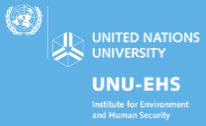A human livelihood perspective should be better integrated into resilience work and adaptation strategies, according to a paper published by Nature Climate Change.
The paper was developed by 25 senior experts and young researchers collaborating through the UN University's (UNU) 2013-2014 Resilience Academy.
 18 December 2014: A human livelihood perspective should be better integrated into resilience work and adaptation strategies, according to a paper published by Nature Climate Change. The paper was developed by 25 senior experts and young researchers collaborating through the UN University’s (UNU) 2013-2014 Resilience Academy.
18 December 2014: A human livelihood perspective should be better integrated into resilience work and adaptation strategies, according to a paper published by Nature Climate Change. The paper was developed by 25 senior experts and young researchers collaborating through the UN University’s (UNU) 2013-2014 Resilience Academy.
The UNU’s Institute for Environment and Human Security (UNU-EHS) and the International Centre for Climate Change and Development (ICCCAD) hosted the Resilience Academy to study livelihood resilience as it is threatened by weather extremes and a changing climate. The researchers and practitioners gathered in 2013 and 2014 to examine challenges to “maintaining stable and robust” livelihoods, resulting effects such as loss of income and forced migration, and strategies for coping now and in the future.
The paper finds that in focusing on the development needs of the world’s poor and vulnerable populations in the face of climate change, research and policy must better incorporate the normative, social and political dimensions of adaptation. According to the authors, a livelihood perspective emphasizes human needs and their agency, empowerment and human rights.
A series of working papers will also be published by UNU-EHS in support of the paper’s conclusions. Additional Resilience Academies are planned for 2015 and 2016 on ‘Enhancing Resilience to Minimize Loss and Damage – Providing Knowledge for the UNFCCC.’ [UNU Press Release] [Working Paper Series] [ICCCAD Livelihoods Webpage]